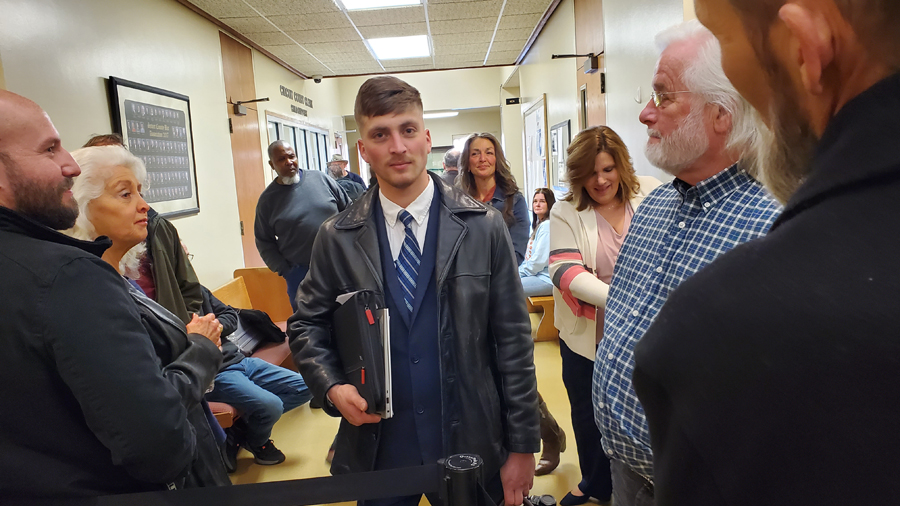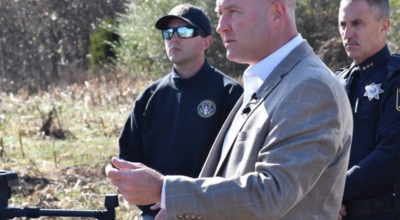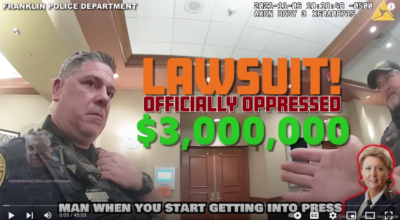
Preston Settle greets onlookers outside the circuit court room in Sevier County, Tenn. (Photo David Tulis)
SEVIERVILLE, Tenn., Thursday, Jan. 11, 2024 – Judge Rex Ogle today steals a trial by jury of a young man who is challenging police and deputy abuse of the trucking law against the general public.
By David Tulis / NoogaRadio Network
Preston Settle is due to begin a trial this morning in Sevier County circuit court under Judge Ogle, whose office texts Mr. Settle the day before the trial that the time had changed to 9:30 a.m. – or so Mr. Settle thinks. Mr. Settle arrives 10 minutes before the 9:30 trial time, only to find that the jury has been dismissed and that he is subject to immediate arrest for not showing up for trial.
He arrives topped by a black beret, bearing a satchel, passing through a crowd of 87 people who were to have been his jurors on three misdemeanor counts involving use of his car and what he sees as a fundamental American liberty.
Mr. Settle enters the circuit courtroom. A deputy takes him by the cuff and forcefully draws him to the podium to explain himself. The misreading of the text message puts Mr. Settle in a terrible bind. No clerk attempts to phone Mr. Settle to ask where he is. He is highly courteous, proper and well-spoken. The judge speaks highly of his person and character.
Judge Ogle says that the jurors were amassed at 9 o’clock and when he didn’t show up he dismissed them. Mr. Settle had been across the street in a bank dealing with a notary – all futile given his slipup.
Liberty converted into ‘admission’
Mr. Settle states that he is not a driver operator, and effectively admits that he is on the road without a registration tag, a driver license or any proof of insurance or other financial responsibility. These are facts that the judge takes as “admissions” of having committed three crimes alleged.
What the judge takes as admissions are facts that, according to Mr. Settle, put him outside the subject matter jurisdiction of the court. By his own design and intention Mr. Settle refuses to apply for the privilege of being a driver or operator of a motor vehicle.
Under threat of a capias warrant, Mr. Mr. Settle agrees to obtain a driver license, insurance proof and registration for his automobile, ordinarily called a pickup truck. He is told that if he shows up in court Feb. 6 with these evidences of the privilege, the charges will be dismissed. If he shows up without them he will be jailed immediately, the judge says.
“I don’t want to put you in jail,” Judge Ogle says. ‘I don’t want to put you in jail.” Mr. Settle insists he has suffered “lack of due process,” but the judge insists he has received plenty of due process.
Mr. Settle had made extensive research and preparations to defend the right of movement and communication apart from the privilege.
As to the failure to exhibit on demand law under which Mr. Settle is charged, he says he has never been a licensee, and that the law doersn’t apply to him. It says “Every licensee shall have the licensee’s license in immediate possession at all times when operating a motor vehicle and shall display it upon demand of any officer or agent of the department or any police office ***j “ 55-50-351. License to be carried and exhibited on demand — Arrest and penalty for violations.

Preston Settle, 21, prepares for trial Jan. 10, 2024, in Sevierville, Tenn. (Photo David Tulis)
Judge Ogle says “We’ve pled this issue numerous times.” Mr. Settle says correctly the subject of the law has to be a “licensee,” and he is not one because he has not applied to become one.
“You are going to get your license plate and your insurance. The state will dismiss if you do that.”
Judge Ogle is practicing law from the bench, as an assistant district attorney sits dumbly at his table letting the court perform the state’s job.
‘Not my job,’ judge says of magistrate breach
Mr. Settle says a due process violation imposed by the magistrate during his three days in jail requires dismissal. The magistrate set a F$1,000 bond, and when the mittimus is completed for Mr. Settle to sign, he peers down at “all rights reserved” in lieu of signature, snatches the paper from Mr. Settle, and raises the bond to F$5,000. This is a breach of judicial ethics to alter a document for a punitive purpose, Mr. Settle says. The magistrate issues a second mittimus, again at F$1,000.
Albert Schneider used intimidation tactics to knowingly intimidate and change bond, Mr. Settle says, and has no right to change government document. He “broke the law,” and has no discretion to reject an X as signature, or a thumbprint, Mr. Settle says to the court.
Judge Ogle says he is being very patient, saying, “We’ve been through this before, please don’t do this again.”
Mr. Settle demands, “What are you going to do about Albert Schneider?” The hearing before the magistrate “did not have the officer present,” as required.
“That’s not my job,” Judge Ogle says. He is a state judge, not a county judge, and it’s not his business, the judge says, saying he has no authority, and won’t comment.
He says he is “trying to do the right thing by you, and to get you legal, and we’re good.”
Judge Ogle says indictment cures “some of the defects” in the case, like those he points out.
As to his status as a free man not under privilege, and hence a violator, the judge says,
“You admit it, you admitted it to this court, on numerous occasions.” As for the driver license, the judge says, “I have to have it. You have to have it.”
The clerk refuses to file Mr. Settle’s motion to dismiss that he proffered on arriving at the clerk’s window. She refuses, and tells him to go immediately into the court.
Ogle says Mr. Settle’s proper challenge to subject matter jurisdiction is not an issue before the court, and all without a single word of defense of subject matter jurisdiction from the prosecutor.
Mr. Settle is resigned to being coerced into commerce under privilege. Mr. Settle says he has prospect of a job that would require him to use his auto in commerce, and that if that happens he would comply in good conscience with the privilege scheme since he might be using the road to haul goods or passengers for hire.
Coerced into commerce
“If an individual hires me and says, listen, I want to use your truck for hauling goods over the roadways. And I say ‘OK, I’ll do that. Now I’m going to register my vehicle and now I’m gonna get my drivers license, registration. Now there’s a commercial gain. Now have reason to get it. Now that truck was never for commercial gain, OK? It was never within the scope of subject matter jurisdiction off the charging charging statutes – never was. So with my employer who employs me, employs my vehicle for commercial gain on the roadway, now I have a reason to register now, the reason to insure now. I have a reason to get the driver’s license. And now this is a win-win situation. *** I’m not feeling pressed with my conscience. That’s correct. Now I am doing it according to law, and not in violation of the law, and I’m not accepting a privilege for what I have a right to do, if that makes sense.”
Mr. Settle has a clear understanding of how the privilege regime works. Is a person with a driver license always “on” the license? No, he says.
“If you’re on the license, you’ve got the privilege. If you’re off the license in a vehicle that is registered, you’re not, and you’re not using it for commercial gain, the registration, the license does not need to be displayed. OK, so there’s the difference. There’s a difference when you’re on the license, you have to prove. When you’re off the license, you’re not using your vehicle for commercial gain. OK, the presumption – there is no presumption” and the man or woman behind the wheel simply rebuts presumption of commerce.
By law in Tennessee, a challenge to subject matter jurisdiction by defendant has to be proven by the moving party, the state. In the course of the hearing, Mr. Settle cites several cases, including Aptheker et al v. Secretary of State, 378 U.S. 500 (1964).


“Supposed “judge” Ogle says Mr. Settle’s proper challenge to subject matter jurisdiction is not an issue before the court, and all without a single word of defense of subject matter jurisdiction from the prosecutor.”
Again you have a masquerader stating that the challenge to jurisdiction/authority is proper, and that he (the NOT Lawfully empowered, “pretend” judge has not Lawfully acquired jurisdiction with regard to Preston Settle, the Living man), yet still moves to order violence against him, should he choose to not “bow down” to corporate powers that do not exist, except by fraud and threat of violence.
To hell with the Law, and those maxims that clearly state “Fraud vitiates (destroys) the most solemn of contracts.”
One has to STAND one’s GROUND asserting all their “Due Process, Constitutional and Civil Rights to the corporation, because they will NOT acknowledge them, until one fundamentally STANDS firmly asserting them.
One has to STAND one’s GROUND and assert one’s “Due Process, Constitutional and Civil Rights to the corporation, because they will NOT acknowledge them, until one STANDS firmly upon them.
Attorneys cannot argue facts not in evidence – https://casetext.com/case/trinsey-v-pagliaro
One of the elements REQUIRED to prove jurisdiction IS a harmed or damaged man or woman, OR breach of contract.
Traffic Script – https://www.youtube.com/watch?v=x_UWPeI_dAI
Common law – https://www.youtube.com/watch?v=6pKqH5C_82M